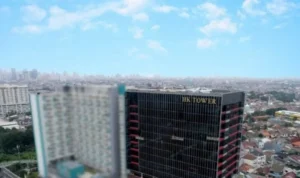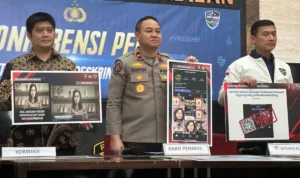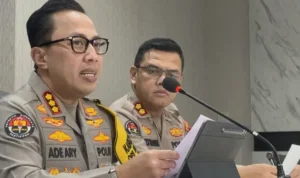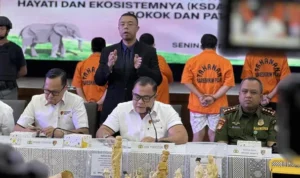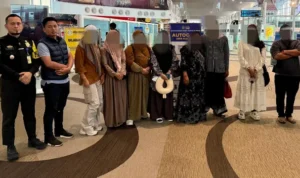INDONESIAUPDATES.COM, News En – The case of land certificate forgery in Kohod Village, Tangerang, Banten, has taken a dramatic turn as the Directorate of Criminal Investigation (Dittipidum) Bareskrim Polri reveals that the underlying motive for the forgery is rooted in economic gain. Recently, four suspects were named in the case, which involves falsifying Land Rights Certificates (SHGB) and Property Ownership Certificates (SHM). The suspects include the Village Head (Kades) of Kohod, Arsin, Kohod Village Secretary (Sekdes) UK, and two individuals acting as authorized representatives, SP and CE.
During the investigation, it became clear that there was a deliberate effort to manipulate documents related to land ownership in the area, with a clear economic motive driving the actions of the suspects. The police have pointed out that the suspects’ attempts to conceal the financial gains related to the forgery suggest the involvement of personal interests and illicit financial benefits.
Suspects in the Land Certificate Forgery Case
The four individuals named in the case are suspected of working together to falsify a range of essential documents required to apply for land ownership certificates. These falsified documents include girik (traditional land certificates), physical occupation statements, land certificates, and power of attorney letters to manage the application for land certificates from residents of Kohod Village. The falsifications took place between December 2023 and November 2024.
One of the most significant developments in the investigation was the confrontation between the Kohod Village Head, Secretary, and the authorized representatives. When questioned about the money involved in the forgery, the suspects seemed to pass blame on each other, indicating that the motive was primarily financial.
Economic Motive Behind the Forgery
Polri’s investigation into the case reveals that the driving force behind the forgery of land certificates is financial gain. Director of Criminal Investigation (Dittipidum) Bareskrim Polri, Brigadier General Djuhandhani Rahardjo Puro, explained that the primary goal of the forgery was to secure illicit financial benefits. While the exact amount of money involved in the case remains unclear, the suspects’ behavior and shifting blame indicate that they were seeking personal economic advantages.
The investigation continues as the authorities work to uncover the complete flow of money in the case, but the initial findings suggest a clear link between the forged certificates and financial profit.
Police Investigation and Evidence Seized
As part of the investigation, the Polri team has conducted searches at several locations suspected of being connected to the forgery. The police have seized several pieces of evidence, including a printer, a monitor, a keyboard, and the Kohod Village Secretary’s stamp. These items are believed to have been used in the forgery of girik and other land documents.
Additionally, the police sent 263 certificates seized from the suspects to the forensics lab for verification of their authenticity. These certificates, which include 263 SHGBs and 17 SHMs, were allegedly issued to residents of Kohod Village, and the authorities are now working to confirm whether the documents are legitimate or if they were part of the fraudulent scheme.
Connection Between the Case and the Sea Wall Project
This land certificate forgery case is closely related to a larger issue involving the sea wall project in Tangerang. The forged certificates were used to apply for land that was allegedly not eligible for ownership, suggesting that some of the land may have been connected to the ongoing sea wall development. Investigators are now working to uncover the exact link between the forged certificates and the project, which has already stirred controversy.
Legal Process and Potential Penalties
The four suspects involved in this forgery case are facing charges related to the falsification of documents and the submission of false statements into official records. If convicted, they could face penalties under the Indonesian Penal Code (KUHP) concerning document forgery.
The investigation is still ongoing, with the authorities continuing to gather evidence to determine the full extent of the forgery and identify anyone else who may have benefited from these illicit actions.
Conclusion and Hopes for Justice
This case of land certificate forgery in Kohod Village serves as a stark reminder of the importance of transparency and integrity in land administration. The investigation has revealed that individuals involved in land management have exploited the system for personal financial gain, undermining the trust of local residents and damaging the credibility of the land registration process.
Moving forward, it is crucial that the authorities continue to pursue justice in this case and ensure that those responsible are held accountable. This will help restore trust in the land administration system and prevent similar incidents from occurring in the future.
FAQ – Land Certificate Forgery Case in Kohod Village, Tangerang
1. What is the land certificate forgery case in Kohod Village? This case involves the forgery of Land Rights Certificates (SHGB) and Property Ownership Certificates (SHM) in Kohod Village, Tangerang. The forged documents were used to claim ownership of land that was not legally owned.
2. Who are the suspects in the land certificate forgery case? The four suspects include Kohod Village Head Arsin, Kohod Village Secretary UK, and two authorized representatives, SP and CE, who are believed to have been involved in the falsification of land documents.
3. What is the motive behind the land certificate forgery? The primary motive behind the forgery is economic gain. The suspects aimed to obtain financial benefits through the manipulation of land certificates.
4. What documents were forged in this case? The forged documents include girik (traditional land certificates), physical occupation statements, land certificates, and power of attorney letters used to apply for land certificates on behalf of residents of Kohod Village.
5. What impact does this forgery have? The forgery can cause harm to legitimate landowners, disrupt land administration systems, and undermine trust in the land registration process. It also poses a risk to the integrity of land ownership in the region.
6. What evidence was seized during the investigation? Police seized various items during searches, including a printer, monitor, keyboard, and Kohod Village Secretary’s stamp, which were believed to have been used in the forgery of land documents.
7. What is the connection between this case and the sea wall project? The forged certificates were potentially linked to the sea wall project in Tangerang, as some of the land in question may have been part of the project area. Investigators are examining the relationship between the forgery and the project.
8. What legal charges do the suspects face? The suspects face charges related to document forgery and the submission of false statements in official records. If convicted, they could face legal penalties under Indonesian law.
9. What are the next steps in the investigation? The investigation is ongoing, with police working to uncover the full extent of the forgery, determine the flow of money, and identify anyone else involved in the fraudulent activities.
10. How can this case be prevented in the future? It is essential for the authorities to implement stricter oversight and transparency in land administration processes to prevent similar cases of forgery from occurring. Public awareness and reporting of suspicious activities can also help reduce the risk of fraud in land ownership matters.
FOLLOW INDONESIAUPDATES.COM ON GOOGLE NEWS


